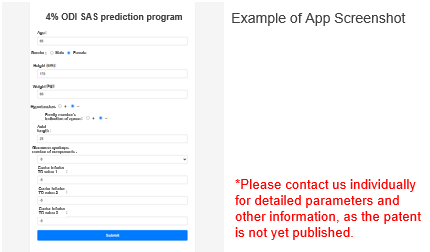Method for Determining Sleep Apnea Syndrome (SAS)
Determining the likelihood of SAS based on responses to medical interviews and glaucoma examination
Overview
SAS can lead to the development of cardiovascular diseases and other complications, resulting in severe symptoms. However, the symptoms of SAS are challenging to recognize, and it is estimated that 1 in 20 people in Japan are potential sufferers. Patients with glaucoma are known to have a higher probability of concurrent SAS, making it beneficial to recommend SAS testing for these individuals to identify undetected cases. However, conducting tests on all glaucoma patients is not practical. This invention introduces a machine learning model and an app that incorporates this model, designed for ophthalmologists to easily assess the likelihood of glaucoma patients having SAS. More than 500 glaucoma patients were recruited and underwent basic ophthalmic examinations, along with the collection of age, gender, BMI information, and home sleep SAS testing for nocturnal oxygen saturation measurements. Patients whose nocturnal oxygen saturation dips below the baseline exceeded a specified threshold were defined as having SAS. The machine learning approach combines systemic and ophthalmic parameters to predict the occurrence of SAS. The app facilitates the input of systemic parameters, including responses to medical inquiries, and ophthalmic parameters, including visual field test results, thus enabling the calculation of the likelihood of having SAS with high accuracy.
Performance and Features

Product Application
・A diagnostic support tool for physicians
Related Works
Paper under preparation
IP Data
IP No. : PCT/JP2023/029855
Inventor : NAKAZAWA Toru, HIMORI Noriko, KIYOTA Naoki
keyword : SAS diagnostic、AI、telemedicine
